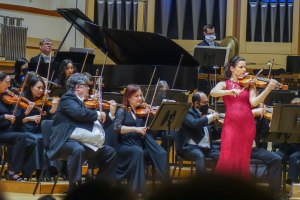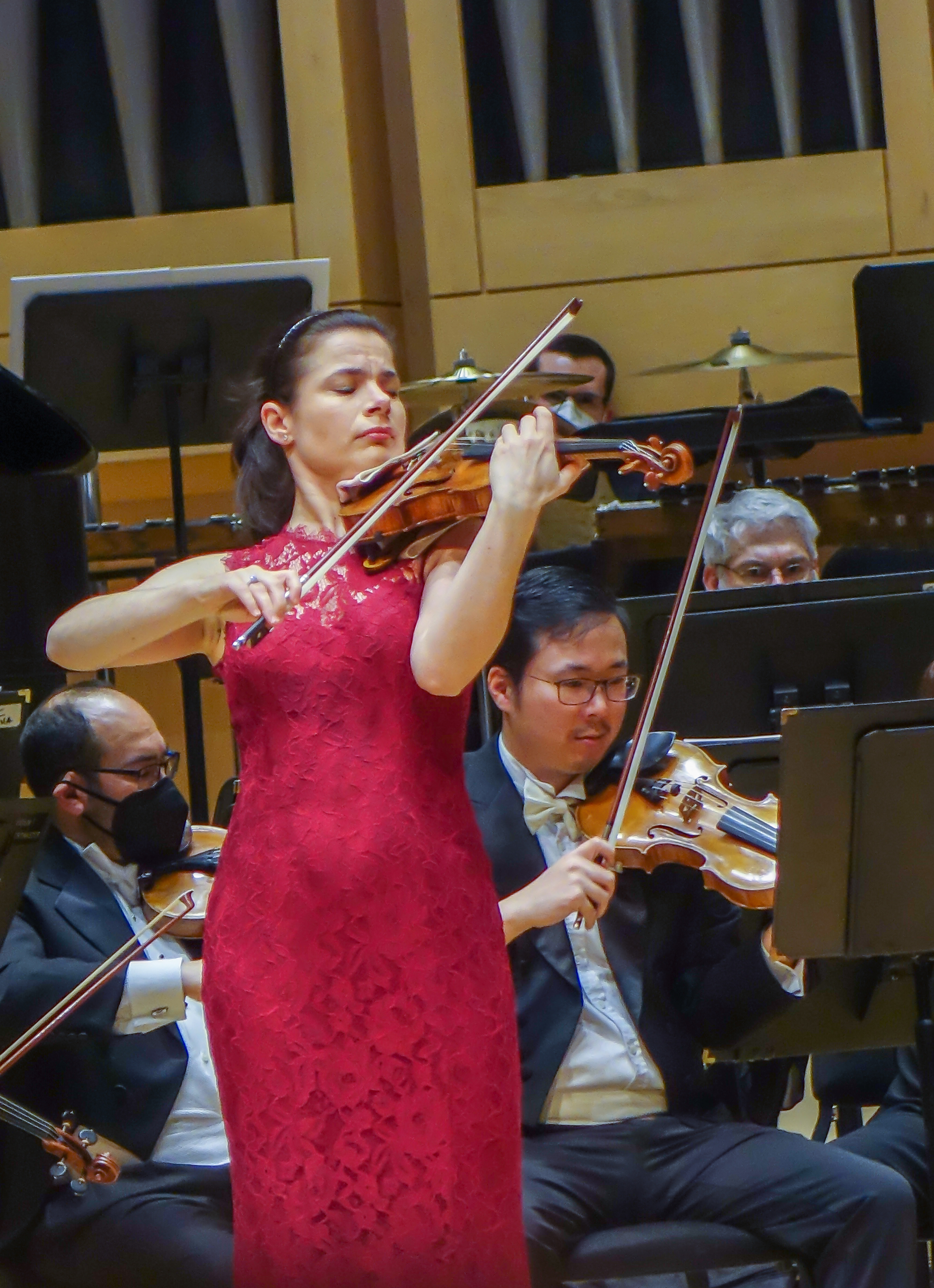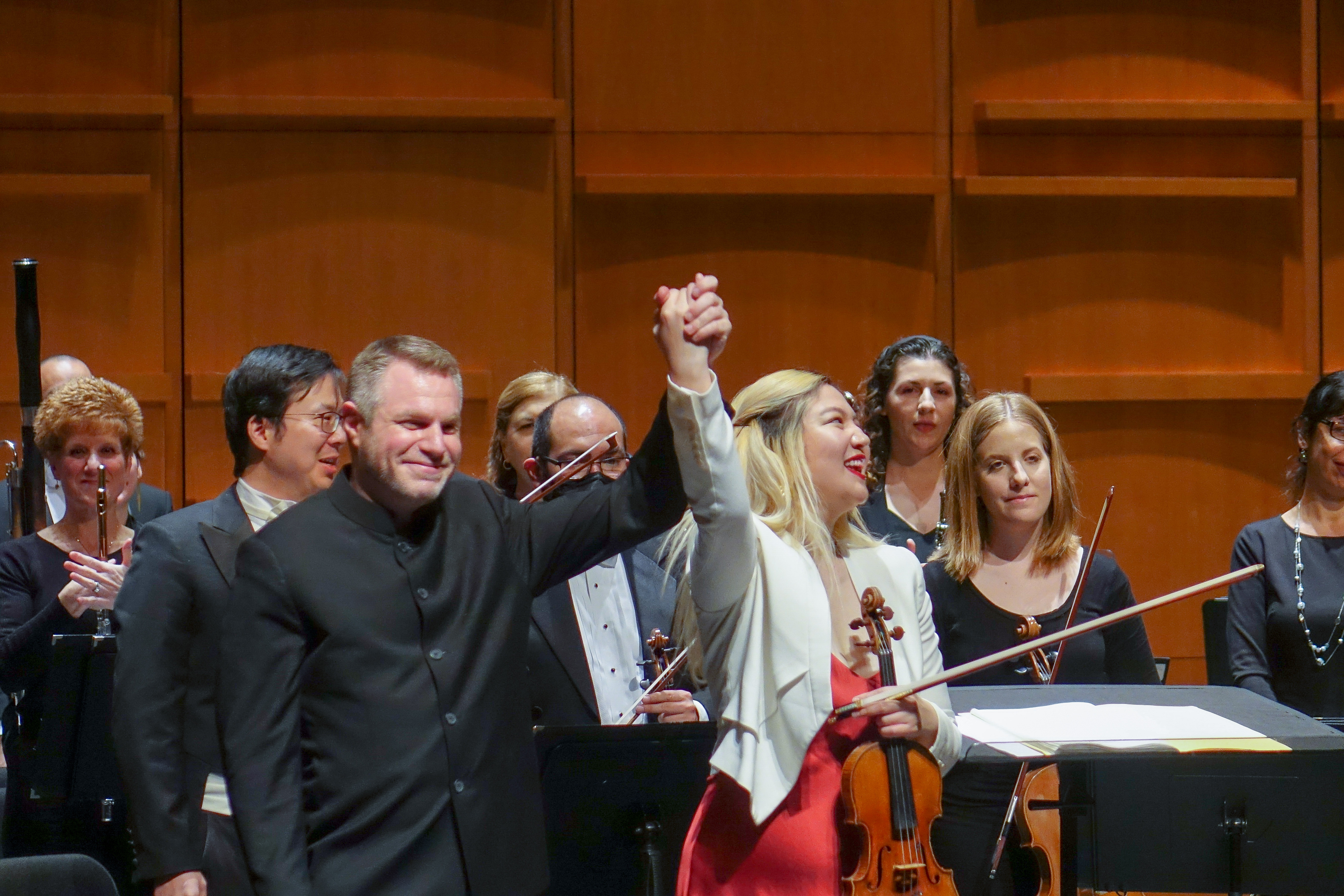Review: Tchaikovsky & Brahms at Belk Theater
By Perry Tannenbaum

April 5, 2024, Charlotte, NC – The audience at Belk Theater didn’t rise and sing the National Anthem as we do at the start of every new Charlotte Symphony season, but the occasion – Tchaikovsky & Brahms – was auspicious enough for Symphony president David Fisk to take the stage, notes in hand, and introduce the Orchestra’s newly designated music director, Kwamé Ryan. On the heels of CSO’s announcement that they were already at over 80% in reaching its $50 million fundraising campaign goal, ensuring Symphony’s financial stability, Classics subscribers had multiple reasons to express their enthusiasm – as Fisk spoke and when Ryan made his entrance. Both events had been sufficiently ballyhooed in the press. Fisk could wait a leisurely eight minutes after the normal starting time to make his appearance, so the usual curtain-up helter-skelter of late arrivals had subsided. Unless Ryan raised his eyes to the uppermost balcony, he saw a packed house ready to erupt.

Ryan’s greeting was even more personable than Fisk’s intro, so audience adoration actually rose a couple of notches before quiet prevailed and he could put his baton to use. This really was the beginning of a new Kwamé Ryan era, and the director designate did not fail to take advantage of that vibe. Instead of the “Star-Spangled Banner,” Ryan began his reign with what felt like the next best thing. With the composer seated in the orchestra, poised to receive more audience adulation, Ryan and Symphony performed Wang Jie’s Symphonic Overture “America, the Beautiful.” A self-professed “lover of adventure on mountains and cliffs,” Wie was thrilled when the Colorado Springs Philharmonic asked her to create a work inspired by nearby landmark Pikes Peak and the song written by Katherine Lee Bates in 1895 to a melody composed more than a decade earlier by Samuel A. Ward.

The commission was not at all outré, since Bates’s original poem was inspired by her first trip to the summit of Pikes Peak. You might say, however, that Jie’s music was inspired by America in 2016, since her description of this work stresses the unifying effect of the song amid political turbulence. She aimed for a piece that acknowledges how “fractured” we are while expressing the hope that a “re-harmonized” take on the anthemic song could still have healing and unifying powers. Fractured episodes alternate with Jie’s re-orchestrated presentations of Ward’s melody, presented in chunks of eight bars each until all of “America, the Beautiful” is reprised with brassy grandeur, followed by a frantically accelerated coda. Curiously, the piece probably does sound a lot more hopeful today, eight years after it was premiered barely two weeks before Election Day. A revision today might not contain the same wan, ruminating passage from the French horns or the silvery wistfulness from concertmaster Calin Ovidiu Lupanu. Wie’s energetic balancing act was almost nostalgic.

Although cellist Joshua Roman performed Tchaikovsky’s Variations on a Rococo Theme in Charlotte as recently as 2012 during an All-Tchaikovsky concert led by Christopher Warren-Green, the piece didn’t skyrocket to mountaintop status for me until Gautier Capuçon played it at the glorious Dvořák Hall during the Prague International Festival of 2019. Reaching that stratosphere would be difficult for both guest soloist Sterling Elliott and Ryan, navigating Pyotr’s score before the vivid memory of Semyon Bychkov’s exploits with the Czech Philharmonic had fully faded. Indeed, the delight and perfection of the Prague experience drifted beyond reach by the time Elliott and the CSO had traversed the mid-tempo prelude, the rococo theme modeled on Mozart, and the first two variations at a friskier pace. Ominously, it dawned on me that this was the first piece I was hearing Ryan conduct with Symphony that wasn’t composed by an American citizen.
With the onset of the dreamy Variation III, Elliott and Ryan found their footing, bringing forth the full sublimity of the Andante sostenuto. At that point, knowing that some bodacious virtuosity lay ahead in the final four Variations and the crowdpleasing coda, I resolved to try and watch Elliott from the perspective of those in the audience who were experiencing the Rococo for the first time. Wiping the slate clean not only enhanced my own experience, it plugged me into the excitement and wonder of the Belk Theater crowd as the buoyed Elliott slashed through the pyrotechnics in the latter half of Tchaikovsky’s concerto and shredded his bowstrings. If you factor in opening night jitters, Elliott’s encore figures to be even more awesome.

The Brahms Symphony No. 1 built to a similarly walloping climax after intermission. Limited rehearsal time – or simply the limited time Ryan and the Orchestra have had to become acquainted with each other – may have accounted for the somewhat listless and shapeless reading of the opening Un poco sostenuto and its subsequent transitions back and forth from Allegro. It was in the ensuing Andante sostenuto, where acting principal oboist Erica Cice had multiple chances to shine bookending principal clarinetist Taylor Marino’s eloquence, that the ensemble seemed to discover its voice, capped by some subtle soloing from Lupanu.
Marino spun a little more magic, in league with principal flutist Victor Wang, at the start of the third movement Allegretto as the ensemble ramped up for the grand finale, where Brahms First echoes Beethoven’s last. Here was where we could find the most encouraging examples of the pacing, sculpting, and exhilaration we can expect as Ryan settles in with Symphony for seasons to come. Repeatedly, principal French hornist Byron Johns was impressive, first as he hovered above the brass and later in concert with the other horns. There was admirable warmth from the strings in the big tune, with effective spotlights from Wang, Cice, and the four trombones. Everything was clicking during this finale, which crested with thunder, and the audience called Ryan back from the wings again and again with a standing ovation.








